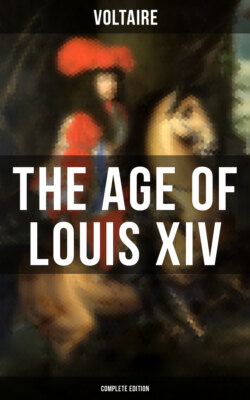Читать книгу The Age Of Louis XIV (Complete Edition) - Voltaire - Страница 8
На сайте Литреса книга снята с продажи.
GERMANY.
ОглавлениеThe Empire of Germany is the most powerful neighbor which France has; it is nearly of the same extent; there is not, perhaps, so much money in it, but it abounds more with sturdy men inured to labor. The Germanic nation is governed, with but little difference, as France was under the first kings of the Capetian race, who were chiefs of several great vassals. by whom they were frequently ill obeyed, and of a great number of lesser ones. There are sixty free cities, called imperial; about as many secular princes; nearly forty ecclesiastical ones, as well abbots as bishops, nine electors, among whom we may reckon four kings; and lastly, the emperor, who is head of all these potentates: these at present compose this great Germanic body, which, by the phlegmatic disposition of its members, is maintained in as much order and regularity as there was formerly confusion in the French government.
Each member of the empire has his particular rights, privileges, and obligations; and the knowledge of such a number of laws, which are frequently disputed, makes what is called in Germany “the study of the public law,” for which that nation is so famous.
The emperor should not in fact be much more powerful or rich than a doge of Venice. Germany being divided into cities and principalities, nothing is left for the chief of such a number of states, but the pre-eminence, accompanied with the supreme honors, without either demesnes or money, and consequently without power. He does not possess a single village in virtue of his title of emperor. Nevertheless this dignity, often as vain as supreme, has become so powerful in the hands of the Austrians that it has frequently been feared that they would convert this republic of princes into an absolute monarchy.
The Christian part of Europe, especially Germany, was then, and still is, divided into two parties or sects. The first is that of the Catholics who are all more or less subject to the authority of the pope; the other is that of the enemies to the spiritual and temporal power of the pontiff, and the prelates of the Church of Rome. These latter are called by the general name of Protestants, though divided into Lutherans, Calvinists, and other sects, who all hate one another as much as they do the Church of Rome.
In Germany, the states of Saxony, Brandenburg, the Palatinate, a part of Bohemia and Hungary, the houses of Brunswick and Würtemberg followed the Lutheran religion, which is by them called the evangelical. All the free cities of the empire have likewise embraced this sect, as seemingly more agreeable to a people jealous of their liberty than the religion of the Church of Rome.
The Calvinists, who are scattered among the Lutherans, form but an inconsiderable party. The Roman Catholics constitute the rest of the empire; and, having at their head the house of Austria, they are without doubt the most powerful.
Not only Germany but all the Christian states were still bleeding with the wounds of the many religious wars in which they had been engaged; a madness peculiar to Christians, and unknown to idolaters, and which was the fatal consequence of that dogmatic turn, which had for so long a time been introduced among all ranks of people. Almost every point of controversy occasioned a civil war; and foreign nations—nay perhaps our own posterity—will one day be at a loss to comprehend how their ancestors could have thus butchered one another, while they were preaching the doctrine of patience.
I have already shown how near Ferdinand II. was to changing the German aristocracy into an absolute monarchy. and how he was on the point of being dethroned by Gustavus Vasa. His son, Ferdinand III., who inherited his politics, and like him made war from his cabinet, swayed the imperial sceptre during the minority of Louis XIV.
Germany was not then so flourishing as it has since become. Not only was every kind of luxury wholly unknown there, but even the conveniences of life were very scarce in the houses of the greatest noblemen, till the year 1686, when they were introduced by the French refugees who retired thither and set up their manufactories. This fruitful and well-peopled country was destitute of trade and money: the gravity of manners and the slowness peculiar to the Germans deprived them of those pleasures and agreeable arts which the more penetrating Italians had cultivated for many years, and which the French industry began now to carry to perfection. The Germans, though rich at home, were poor everywhere else; and this poverty, added to the difficulty of uniting in a short time so many different peoples under one standard, made it then, nearly as at this day, impossible for them to carry the war into their neighbor’s dominions, or support it there for any time. Accordingly, we almost always find the French carrying on a war against the empire within the empire. The difference of government and genius makes the French more proper for attacking, and the Germans for acting on the defensive.
